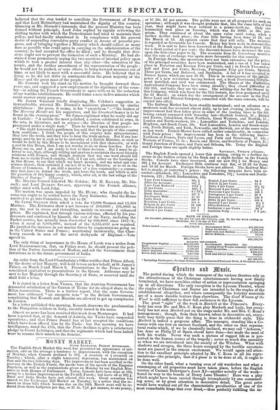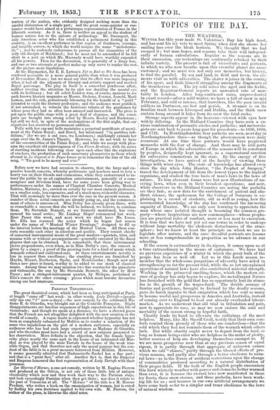quarts Ina Zuoir.
The period during which the managers of the various theatres rely on the attractiveness of the Christmas entertainments having now finally terminated, we have novelties either of action or representation springing up in all directions. The only exception is the Lyceum Theatre, where the staples of Christmas and Easter are intended to be the staples of the establishment altogether, and where consequently the holyday materials are of a more durable texture than elsewhere. The Good Woman of the Wood is still sufficient to draw full audiences to the Lyceum. The great "sight" of the week is Macbeth at the Princess's. Every- body has seen Mr. and Mrs. C. Kean play Macbeth and Lady, but every- body has not seen Macbeth put on the stage under Mr. and Mrs. C. Kean's management; though, from their known talent in decorative art, every- body may fairly guess that the thing is done in recherché style. This Macbeth is indeed a gorgeous affair. The manager, standing like a Co- lossus with one foot on ancient Scotland, and the other on that superna- tural realm which, if we be classically inclined, we may call "Acheron," has done as Philip II of Spain should have done—has made the most of both his worlds. Never was such a picture of rugged life as is pre- sented in the human scenes of the tragedy; never so much dim unreality as when we are introduced into the society of the Witches. What with shadows and savages, the three hours occupied by the terrible entertain- ment are passed in the utmost excitement. We would again call atten- tion to the excellent principle adopted i by Mr. C. Kean in all his repre- sentations—the principle, that if a piece s to be done at all, it ought to be done well.
On the other hand, what a turning over of old wardrobes and what a rummaging of old properties must have taken place, before the English version of Casimir Delavigne's _Louis If—another novelty of the week— found its way to the boards of Drury Lane Theatre! Here was a play which might have been carried through triumphantly by one command- ing actor, or by great attention to decorative detail. The great actor would have worked out all the characteristic peculiarities of one of the most remarkable kings that ever lived,—thus perfectly fulfilling the
tention of the author, who evidently designed nothing more than the careful elaboration of a single part; and the great scene-painter or cos- tumier would have aimed at a picturesque representation of France in the fifteenth century. As it is, there is neither an appeal to the student of human nature nor to the epicure of archology. Mr. Davenport, the only American actor who has established a permanent footing in this country, is an excellent performer in that region of frankness, courage, and tangible sorrow, to which the world assigns the name "melodrama- tic" ; and he zealously endeavours to pursue all the sinuosities of the wily old disciple of Machiavel ; but he must not be astonished if he fall short in a part on which Mr. Macready Irauld have worthily expended all his powers. Then for the decoration, it is generally of a dingy hue, and one or two attempts at perfect make-up only serve to render the rest. of the picture more lugubrious.
At the Haymarket, Sir E. B. Lytton's Hot so Bad as We Seem has been rendered accessible to a more general public than when it was produced at Devonshire House ; but we must say that its effect was more imposing when it had all the adjuncts of literary and artistic support and marked Royal patronage. The play in itself is a somewhat ponderous affair, neither riveting the attention by its plot nor dazzling the mental eye with its brilliancy ; but all select London was, of course, anxious to see such known literary magnates as Messrs. Dickens, Forster, Jerrold, Mark Lemon, and the rest, gratuitously labouring for the benefit of a "guild" intended to exalt the literary profession ; and the audience were gratified, if not astonished, to witness the histrionic talents of the gentlemen by whose pens they had so often been amused and instructed. The piece is put upon the public stage with a great deal of elegance, and the comic parts are brought into strong relief by Messrs. Keeley and Buckstone ; but still we feel, in spite of the acclamations of the first night, that our repertoire has received no permanent addition.
Folly with her cap and bells maintains a perpetual pontificate of merri- ment at the Palais Royal ; and Ravel, her missionary "in partibus infi- delium," (for we are a sad race, we Londoners,) smirkingly extends her reign over the St. James's Theatre. However, we do not wish to have all the eccentricities of the Palais Royal ; and while we accept with plea- sure the excellent old extravaganza of Use Fievre Brulante, with its series of startling incidents following close upon each other like the explosions of crackers, the production of such unsavoury pleasantries as those which abound in Le Caporal et la Payse forces us to remember the line of the old song, " 'Tis good to be merry and wise."



























 Previous page
Previous page